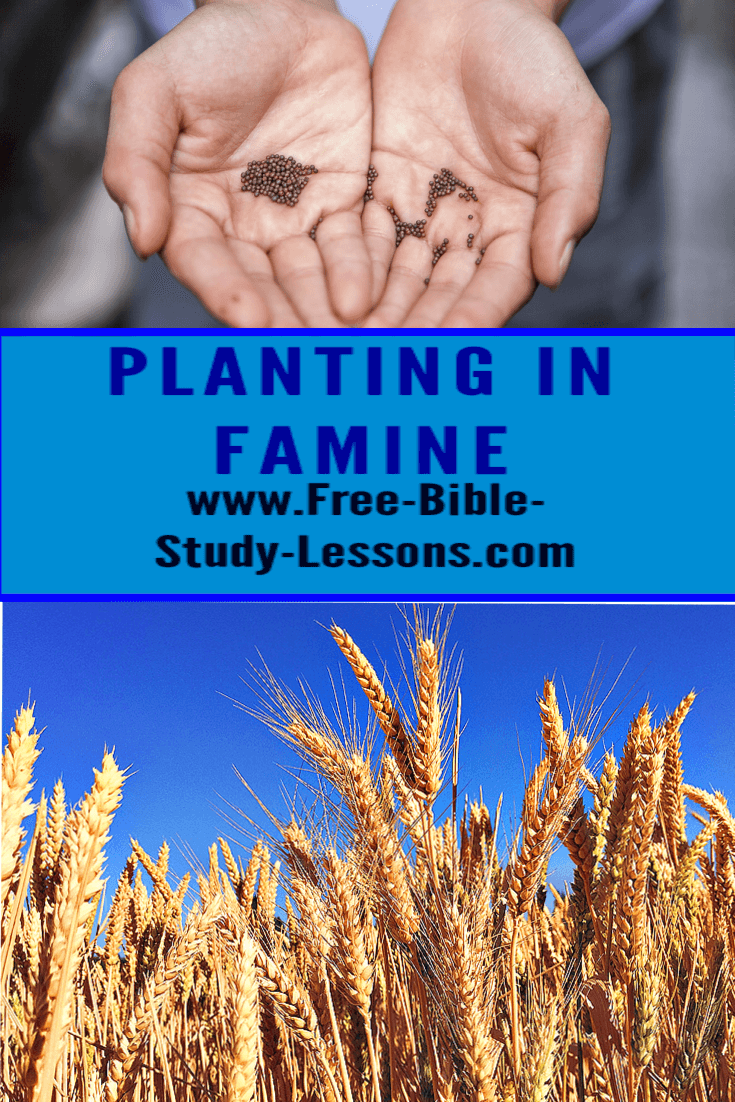| site search by freefind |
- Home
- Scripture Snapshots
- Planting in Famine
[If you purchase anything on this site, I may make a commission. Disclosure Policy]
Planting In Famine
Isaac planted crops in that land and the same year reaped a hundredfold, because the Lord blessed him. Gen. 26:12, NIV
This is an interesting story. There was a famine in the land. Isaac decided to move to Gerar in the land of the Philistines to find relief. We don’t know exactly how much time passed from this move to when the above verse happened: it is simply recorded as ‘a long time.’ In any case, a famine drove him into Philistine territory and he settled down.
Sitemap -
Newsletter -
Statement Of Faith -
Donate
Follow us on social media for daily Scripture comments and more at MeWe, Facebook or YouTube.
It took faith for Isaac to plant his crops in the face of lack. He needed food, but he planted seeds. In spite of what his eyes saw, he had the vision to use what was in his hands to work toward what he needed. And when he reached out in faith, the Lord blessed with an abundant harvest. It was not simply a natural harvest, but a supernatural blessing of God. Even the Philistines envied him.
We tend to focus on what we need and what we lack. We need healing, we need broken relationships fixed, we need a job, we need money, we need friends, we need a spouse, we need peace, we need joy, we need…
If we truly want to become like Jesus, we have to learn to think the way God thinks - which is often opposite to our natural instincts. We think about what we need or would like to have. God thinks about what we already do have.
We can see this in the miracles of the loaves and fishes [Matt. 15:34]. The disciples saw the lack. They saw thousands of people that Jesus wanted them to feed. They felt helpless and overwhelmed. What did Jesus do? He asked them what they had. He wanted them to focus on what they already had, not on the impossible amount that they needed.
Elijah and widow is another example of this principle [1 Kings 17:7-16]. You know the story. Big evangelist rolls into town and asks a poor widow for a drink and a meal. The widow informs him that all she has is little flour and oil that she is going to use for a last meal for her son and herself before they succumb to starvation. At least she knew what was in her hand, without having to think about it. When you don’t have much, it is easy to take inventory. Did her desperate situation change Elijah’s mind? No, he still wanted a meal. [Note: If he had allowed his compassion to overrule the Word of God, she would have starved.] As she invested the little that she had, God miraculously increased it so she had enough to live on.
You can see this theme again and again. Look at what you do have. Use what you have. Invest it according to God’s direction and He will take what you do have to provide what you do not have. If all you see is your need, you have no starting point. If you think what you have is too small, you have not seen the greatness of God. If you consume the little you have in trying to stretch it to met an impossibly large need, you will fail and not have any ‘seed’ to put into God’s hand. Invest what you have in faith, according to God’s direction not your wisdom, and watch the harvest come in in unexpected ways.
God always takes what we have, to give us what we do not have. What is in your hand? What do you have? Make list and present it before God. Start the New Year in thanksgiving for what you have - however small - and give it to God to watch it grow. You likely have some health, some good relationships, some finances, etc… What do you have?
Follow us on social media for daily Scripture comments and more at MeWe, Facebook or YouTube.
Sitemap -
Newsletter -
Statement Of Faith -
Donate
Sign up for our free monthly newsletter or take one of our free Bible Study courses.
Please note: We no longer have the commenting feature [maybe again in the future]. Joshua Institute students who have questions or comments on their courses can use the contact button and mention the course name and lesson number in the email. Thank you. Glenn

Privacy - Disclosure

